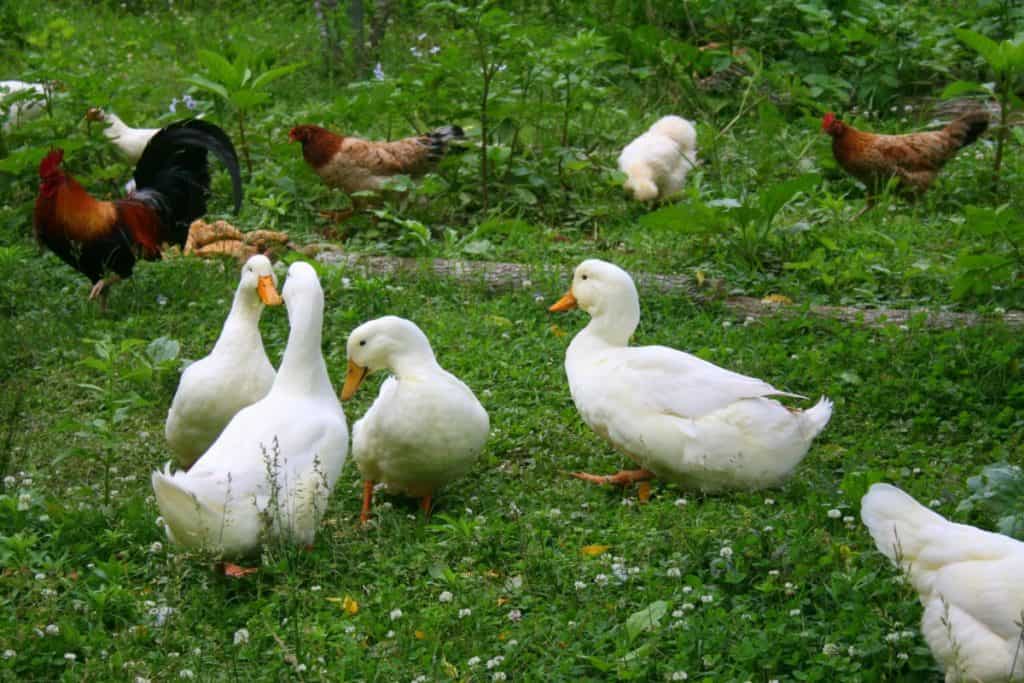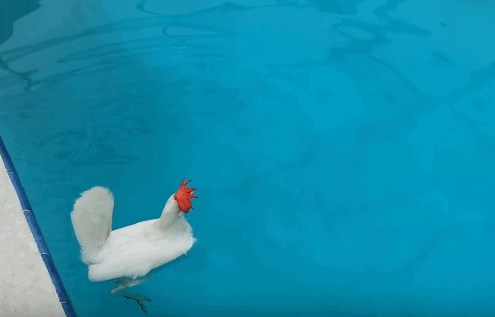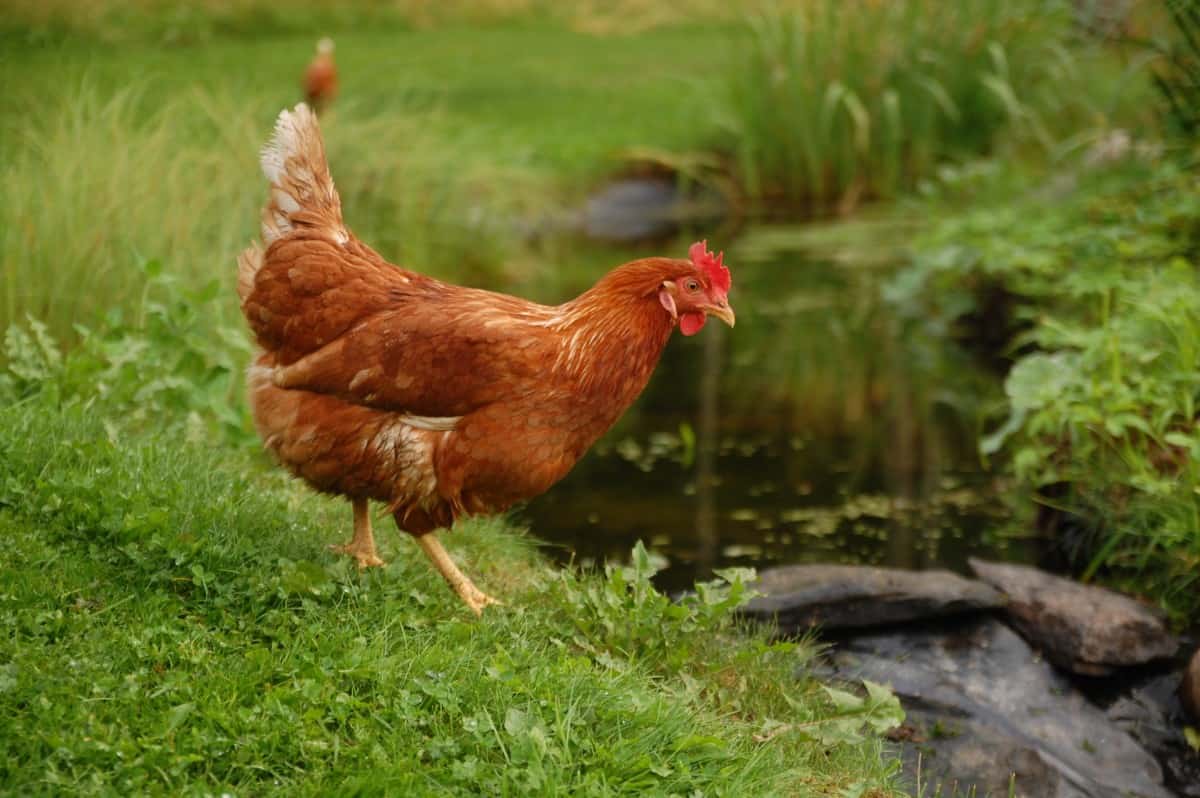There are enough reports of owners finding their chickens dead in swimming pools, ponds, and even large drinking basins to make it easy to assume that these birds cannot swim. But is this really true?
Chickens are capable of floating and swimming, but they are not built for even a semi-aquatic life. Too long in the water leaves them tired, cold, and water-logged, so if they are stuck in a pool, pond, water trough, etc., they can drown. Chickens shouldn’t swim in pools as chlorine is bad for their skin.
Chickens can swim, but they are not waterfowl, they don’t have waterproof feathers and swimming can have a negative impact on their health and even cause death. This article delves deeper into what makes chickens poorly adapted to swimming, why they often drown, and more.

Are Chickens Built For Swimming?
Chickens are capable of swimming, but this does not mean that they were built to swim. To understand this, you can compare them to ducks, who are definitely physiologically and anatomically adapted for swimming.
Duck Vs. Chicken: Feet
A duck’s feet are webbed, which gives them innate abilities to swim efficiently. For every kick of their legs, a greater force is exerted, allowing them to move through the water faster and with less energy expenditure than would be required if they did not have webbed feet.
Chickens can use their feet to move through water, but they do not have webbed feet. This means that they expend a lot of energy to move through the water compared to ducks.
Duck Vs. Chicken: Body
Ducks have hollow bones, or rather the inside of their bones consists of mesh-like structures as opposed to solid bone. This means that a duck’s body is not very dense, and they are able to float in a body of water and have better swimming abilities.
Chickens also have hollow bones—this is actually a defining feature of all birds. This means that, in terms of body density, chickens are just as capable of floating on water as ducks are.
Duck Vs. Chicken: Feathers
Ducks have special glands that release oil over their feathers. This oil helps to prevent their feathers from becoming wet and water-logged. It also provides a heat insulation function.
Chickens do not have these oil glands, so their feathers are un-coated. This means that when they swim, their feathers get water-logged, making it harder for them to stay afloat and also allowing water to sit against their skin and lower their body temperature.
How Long Can Chickens Swim For?
I could not find any formal research on how long a chicken can swim. However, it is reasonable to assume that most chickens will not be able to swim for long periods of time because this is not a part of their natural behavior and they aren’t water-resistant.
They might happily swim for ten or twenty minutes, and they might be able to survive for more extended periods of time than this, but they will not be very comfortable or safe swimming for a long time.
If your chicken enjoys swimming, you will have to be extra vigilant to ensure that they do not hop into the water while you are not around to supervise them.
Can Chickens Drown?
Chickens can drown. Chickens are not waterproof. They may be capable of swimming, but they are not built for a life on the water.
As a chicken’s feet are not webbed, swimming becomes quite a tiring pastime for them as they have to use so much energy to move around in the water, especially if the water has a current against which they are fighting.
If a chicken spends too much time in the water, its feathers become saturated and start to weigh it down, making it even harder for the chicken to stay upright and afloat. Furthermore, water sits up against the chicken’s skin lowering its body temperature and depleting energy stores as its body tries to keep warm.
So, ultimately, chickens drown from exhaustion.
Can Baby Chicks Swim?
Unlike their adult counterparts, baby chicks do not have tight feathering that may allow them to float. Instead of feathers, chicks have down, which means if they become wet, they cannot stay warm.
Getting wet increases the risk of drowning, as well as hypothermia, which can kill chicks. Make sure your chick is dried off right away if it gets wet, and return it to the brooder as soon as possible.

How To Prevent Accidental Chicken Drownings
Eliminate any access that your chickens have to rivers, ponds, and swimming pools. This can be done by erecting a high fence around the chicken’s enclosure because chickens are poor flyers.
If you cannot eliminate access to these bodies of water, then make sure you set up a ramp up which they can walk to get out. You should also regularly check on the pool, pond, river, etc., to make sure that no chickens have fallen in and require assistance.
For their drinking troughs, make sure you use shallow dishes to prevent them from getting stuck.
When choosing the size of your chickens’ waterer, remember to account for any chicks that may be around as they can drown in smaller amounts of water. They are also not very coordinated or strong, so they can easily fall into the waterer, but it is very difficult for them to get out again.
Should Chickens Go In Swimming Pools?
There are many online videos of people putting their chickens into swimming pools to see if they float. Other videos document when owners find their chickens swimming around in their pools either on purpose or because they have fallen in.
Swimming pools are a double hazard for chickens. Firstly, as we have already mentioned, chickens can easily drown in a pool if they are unable to climb out again.
Secondly, albeit less fatally, most swimming pools are chlorinated, and chlorine is not healthy for anyone’s skin. You can wash it off of your body in the shower, but this is often overlooked when chickens find themselves in swimming pools.
What To Do If Your Chicken Goes Into The Pool
If your chicken somehow gets into your swimming pool, you get them out immediately. Rinse them well under a warm (not hot or cold) tap or hosepipe to make sure that no chlorine remains on their skin.
You should also ensure that they can dry. If it’s a warm day, let them go run around in the sun. If it is a cold day, try wrapping them up in a towel and sitting with them for a bit (if they are tame enough that this will not be too stressful). Otherwise, you could keep them in a heated room with you until they are drier.
Is It Good For Chickens To Be Out In The Rain?
Chickens can safely stay out in the rain for a little while, but they are unlikely to be happy about it. You will probably see them all huddled together underneath whatever shelter they can find.
Just like when they are immersed in water, rain soaks through their feathers and sits against their skin, making them cold.
As long as your chickens have a warm hen house to run into for protection from the weather, then however wet they get in the rain is their choice, and they should be able to handle it.
Can You Bathe A Chicken?
You can give your chickens a bath, but the chances are that they will not thank you for it. It might be a very stressful ordeal for your chicken, which is very unhealthy for it.
Additionally, you have to be careful what shampoo you use; they do not really make special chicken shampoos. If you are going to bathe them, opt for a very gentle hypoallergenic option.
Unless you absolutely have to, instead leave your chickens to do their own grooming, or at most, wipe them down with a warm, wet cloth.
Conclusion
Chickens are capable of swimming, but they are not built for it.
They have hollow bones, just like a duck, so their bodies are not dense, and they float on water. They can use their legs to swim, but they are not strong swimmers like ducks who have webbed feet. A chicken’s plumage is also not adapted to spending long periods of time in the water.
If a chicken spends too long in the water, it becomes tired, water-logged, and cold as its feathers do not provide any insulation from water. Exhaustion is the most likely reason why chickens drown.
Some chickens seem to like swimming, but you have to watch them carefully while they are in the water, and you also have to ensure that they do not have access to swimming water while you cannot supervise them.





